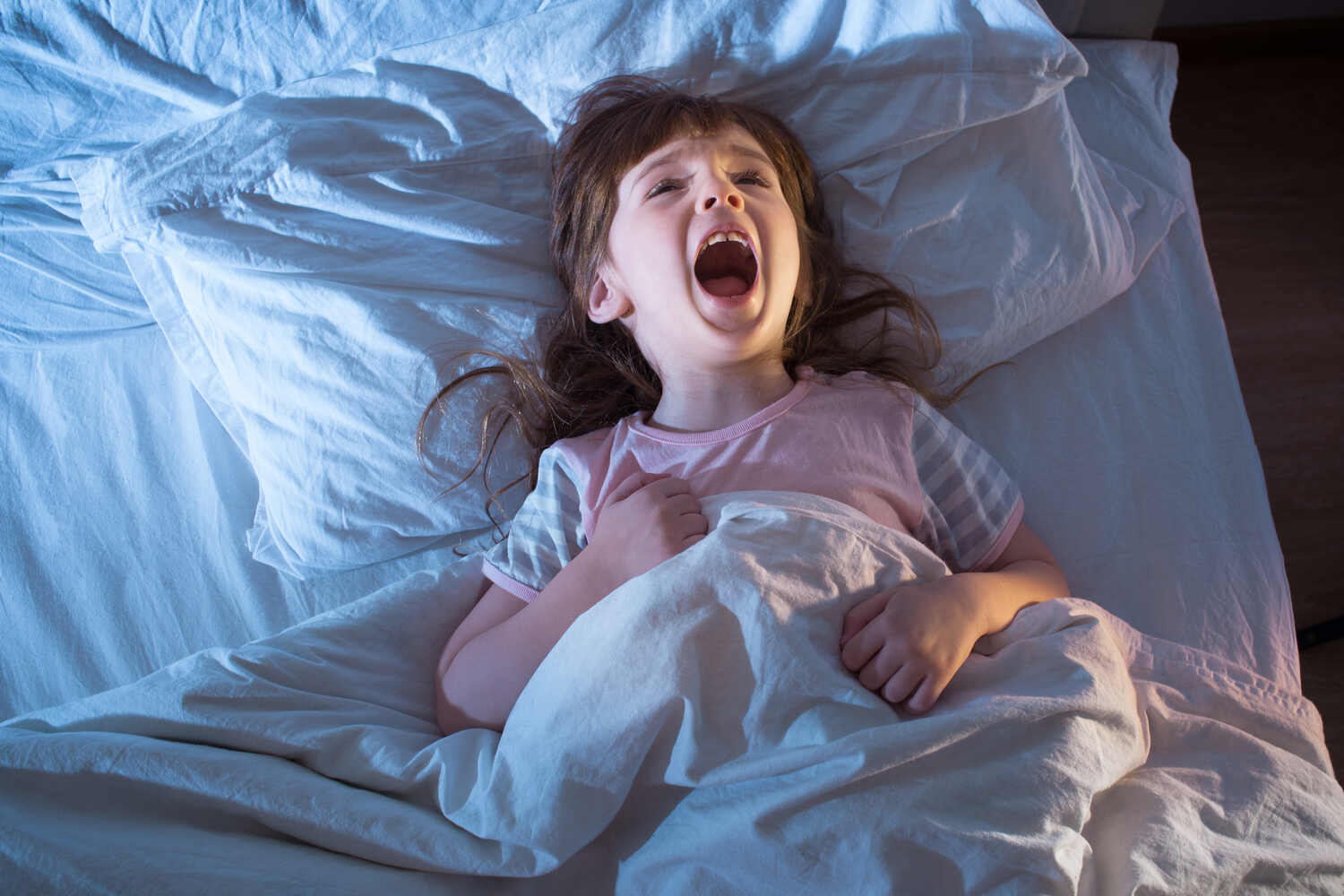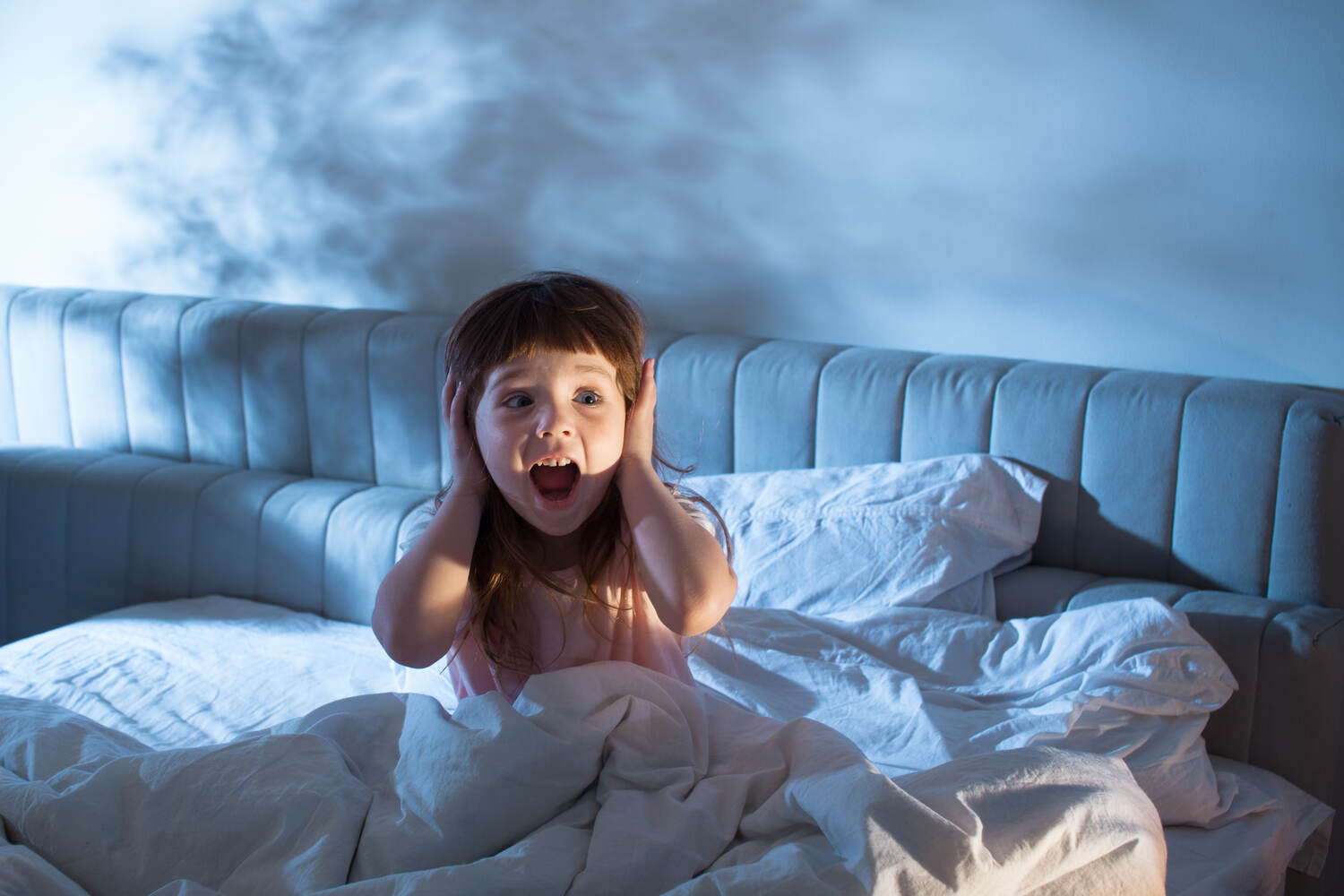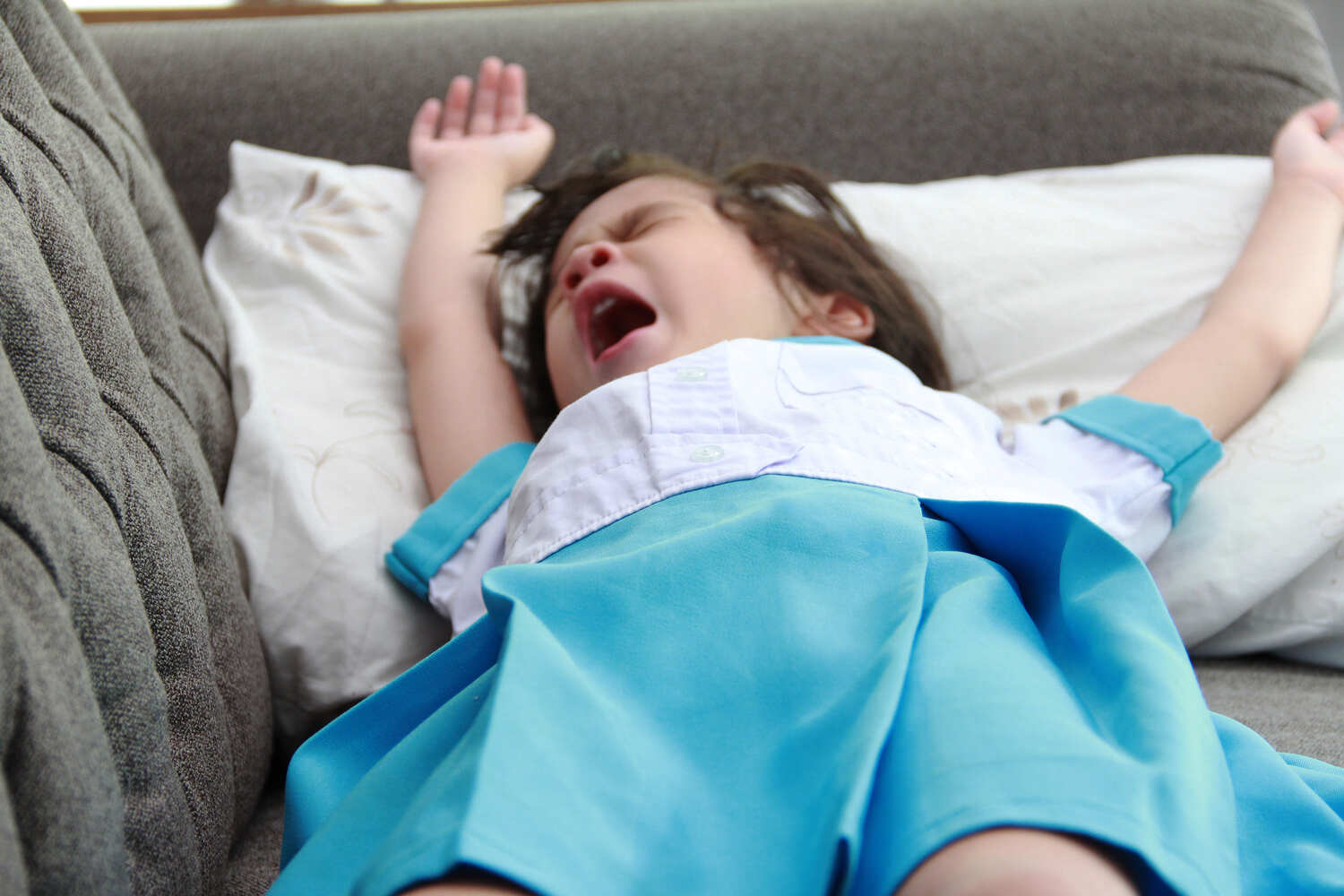
Does your toddler wake up at night with dramatic cries and terror? Though it may seem strange to you, it is not. Almost 39.8 % of children between 2.5 to 6 years old witness night terrors at night (1a). Night terrors in toddlers are genetic and often unavoidable. Yet you need to have full information about it to help your toddler during night terrors.
If you are a first-time mother then night terrors can seem quite frightening to you. To better tackle the situation you need to know what are night terrors and how to distinguish them from normal nightmares. What are the causes and treatments of night terrors? How to prevent night terrors in toddlers? Here is all you need to know.
In This Article
- Video – Night Terrors in Toddlers
- What Are Night Terrors?
- Signs And Symptoms of Night Terrors
- What Causes Night Terrors in Toddlers?
- What Happens in Night Terrors?
- Are Night Terrors The Same as Nightmares?
- How is Night Terror Diagnosed?
- How Are Night Terrors Treated?
- When Should You Consult a Doctor?
- Tips to Prevent Night Terrors in Toddlers
- FAQ’s
Video – Night Terrors in Toddlers
What Are Night Terrors?

Night terrors are sudden awakenings from sleep with fearful screams, crying, and thrashing. Night terror is a common thing in toddlers from all over the world. Both boys and girls can have night terrors. Night terrors usually run in families (2). So if you had night terrors in your childhood, there is a possibility that your kid will also have it.
Night terrors are usually not harmful and reduce as the toddler grows. Toddlers mostly do not remember the night terrors the next morning. But for parents, the situation can be unsettling. Understanding the causes and symptoms of night terrors in toddlers will help you to manage it the next time.
Signs And Symptoms of Night Terrors

The signs and symptoms of night terrors are quite different from normal cries. The signs and symptoms of night terrors are-
- Sudden awakening at night with terror
- Act upset or cry in fear
- Scream or shout out loud in fear
- Thrash around with closed eyes
- Seems awake but confused
- Do not feel that the parents are near
- Do not respond or talk to parents when they try to comfort them
- Sweat due to fast breathing and rapid heartbeat
Night terrors usually take a bit of time to subside. It can take from a few minutes to about 30 minutes to dissolve completely. Be patient with your toddler during this time. Your calming words and warm embrace will calm down your toddler in a few minutes and they will sleep again peacefully.
What Causes Night Terrors in Toddlers?

The specific cause behind night terrors in toddlers is still unknown. Night terrors are genetic and successively passed on from generation to generation. Though there is no specific cause, certain factors can surely contribute to night terrors such as (1b)-
- Lack of sleep
- Stress
- Fever
- Childhood depression
- Sleep in another place
- High protein diet that may cause sleep disturbance
- Intake of soft drinks containing caffeine that may cause sleep deprivation
- Vitamin deficiency
- Medicine that may impact sleep
- Restless leg syndrome
If your toddler is having night terror frequently then try to rectify the underlying factors to avoid it further.
What Happens in Night Terrors?
Our sleep is mainly of two types; REM or rapid eye movement and non-REM or non-rapid eye movement (3). Night terrors happen when our brain remains in the non-REM stage of sleep. This stage starts after around 90 minutes when we fall asleep (4). In this stage often children partly wake up and the survival instinct of the brain makes them overexcited. Hence, they get panicked or terrified and cry, scream, and run around the bed in terror.
Are Night Terrors The Same as Nightmares?
No, night terrors are not the same as nightmares. They are different in terms of their timing as well as their effect on your toddler. While nightmares usually occur in the last third part of the sleep at night, night terrors occur in the first third part. Toddlers do not usually remember night terrors but they often remember their nightmares (5a).
How is Night Terror Diagnosed?
Doctors usually diagnose night terrors simply by asking a few questions about the sleep pattern of your toddler. The signs and symptoms of night terrors are distinctive enough. You can diagnose it even without a doctor’s help. No medical tests are usually needed for the diagnosis.
How Are Night Terrors Treated?

As night terrors mainly happen as a result of sleep disturbance, some advice on avoiding such situations will help to treat them. You may feel helpless seeing your toddler crying continuously. Don’t worry, your kid is completely fine and will not remember anything about the night terror in the morning. To console your toddler during night terrors you can follow steps like-
- Hold the toddler near you and gently pat the back
- Sing a lullaby that comforts your kid the most
- Patiently hold and comfort the kid until they fall asleep
Do not wake your toddler during night terror as this will make the consolation process even longer. Your kid may wake up confused and irritated and take more time to sleep again.
When Should You Consult a Doctor?

Night terrors usually do not need a doctor’s treatment. But you should call a doctor if you notice-
- A night terror lasts more than 30 minutes
- It is occurring more than once a week
- The night terror is affecting the sleep of your kid
- You notice stiffness, sudden jerks, and drooling in your kid during night terror
- The toddler gets extremely sad, afraid, and stressed the whole day
- You notice snoring in your toddler that results in frequent awakening (6)
Take a doctor’s consultation in the above cases to minimize the effects of night terror.
Tips to Prevent Night Terrors in Toddlers
To prevent night terrors you need to make sure that your toddler sleeps without any discomfort. Here are the tips you can follow to prevent night terrors in toddlers-
- Make a nighttime routine and follow it strictly
- Soothe your sleep by giving them a warm water bath, a gentle massage on the head, etc.
- Help your kid manage stress by singing a lullaby or reading a book to them before sleep
- Make sure that your toddler gets sufficient sleep at night
- Reduce afternoon naps if it is causing less sleep during the night
- If the condition is serious such as in the case of obstructive sleep apnea and insomnia then follow the doctor’s recommendations to avoid night terrors
Night terrors usually do not occur every night. But if it is rapid and occurs almost every night at the same time then try waking the toddler 10 to 15 minutes earlier to prevent it.
Night terror is a very common sleep problem in toddlers. It can be dramatic and confusing to console toddlers during night terrors. It may hamper your night’s sleep entirely. So you need to focus on preventing it by ensuring maximum comfort to your toddler during sleep.
FAQ’s
1. Which Vitamin Deficiency Causes Night Terrors?
Vitamin D deficiency can cause night terrors. Vitamin D deficiency is linked with shorter sleep duration, sleep difficulty, and nocturnal awakening in kids. Deficiency of vitamin B6 and other minerals like calcium, iron, magnesium, and zinc can impact sleep too. Their deficiency can cause low serotonin production in the brain which is necessary for regulating sleep.
2. How Can I Treat my Toddler’s Night Terror at Home?
To treat night terrors in toddlers at home you will have to be calm and composed. Sit near your toddler and try to hold them. Make sure they do not get hurt while thrashing around unknowingly. Comfort the toddler with your gentle touch, calming words, and a lullaby. Wait until the toddler goes back to sleep again.
3. Are Night Terrors Linked to Autism?
Autism is linked to trouble with sleep and night terrors as a result of it. But night terrors are not necessarily linked with autism. This means if a toddler is having a night terror that does not mean he/she has autism. However, an autistic child will have more tendency to suffer from night terrors.
4. At What Age do Night Terrors Start?
Night terrors are common in children between 3 to 7 years old (5b). Infants usually do not have night terrors. Night terrors are mainly a problem for toddlers and preschoolers. The frequency and intensity of night terrors will decrease as your toddler grows big.
5. Are Night Terrors Dangerous For Toddlers?
No, night terrors alone are not dangerous for toddlers. But the unconscious and restless thrashing around can surely cause accidental harm. To prevent it grab your toddler close to you during night terrors. Also, make sure there are not any sharp or hard objects near the bed.
6. Should I Wake my Toddler From a Night Terror?
No, you should not wake your toddler from a night terror. You should let your toddler sleep as this will help you to settle your toddler easily. Waking them up will only make them more confused and disoriented. It will then take you even longer to make your toddler sleep again.
References
- Sleep terrors in early childhood and associated emotional–behavioral problems – [https://www.ncbi.nlm.nih.gov/pmc/articles/PMC9435351/]
- Hereditary factors in sleepwalking and night terrors – [https://pubmed.ncbi.nlm.nih.gov/7426840/]
- Sleep Physiology – [https://www.ncbi.nlm.nih.gov/books/NBK19956/]
- Sleep Terrors: An Updated Review – [https://pubmed.ncbi.nlm.nih.gov/31612833/]
- Night Terrors – [https://www.ncbi.nlm.nih.gov/books/NBK493222/]
- Approach to the snoring child – [https://www.ncbi.nlm.nih.gov/pmc/articles/PMC7905134/]
